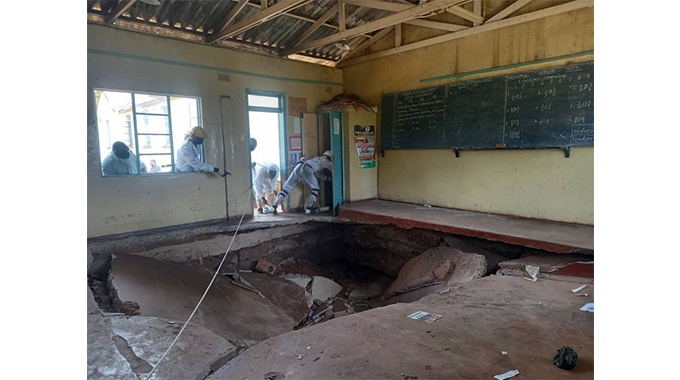Midlands’ golden dilemma Land degradation dominates headlines. . . Urgent action needed for environmental recovery

Patrick Chitumba – [email protected]
THE Midlands Province, known for its stunning landscapes and rich history, is unfortunately making headlines for all the wrong reasons.
According to the Environmental Management Agency (EMA) education and publicity manager, Ms Amkela Sidange, it is one of the leading provinces in terms of land degradation caused by gold mining.
As gold mining continues to take its toll on the province, other pressing issues like waste management and veld fires exacerbate the situation. The consequences of this destructive practice are evident in the crumbling infrastructure, particularly in districts like Kwekwe and Shurugwi.

Ms Amkela Sidange
Ms Sidange highlights the far-reaching impact of land degradation, explaining how it affects not only the physical structures but also the tourism sector, which relies heavily on the province’s natural beauty.
The collapse of a classroom block at Globe and Phoenix Primary School in Kwekwe serves as a stark reminder of the dangers posed by irresponsible gold mining.
This incident underscores the retrogressive nature of such activities and calls for immediate action to prevent further disasters.
Ms Sidange emphasises the importance of recognising the indirect effects of mining, such as the negative impact on water quality, vegetation health, and the well-being of surrounding wildlife.
In an interview, Ms Sidange sheds light on the broader picture of land degradation caused by gold mining.
“The Midlands province is among the leading provinces when it comes to issues of land degradation caused by gold mining activities. It’s among the top three provinces when it comes to land degradation due to mining.”
She goes on to mention other provinces like Matabeleland North and South, Mashonaland Central and West, and Manicaland, which also face significant environmental challenges due to mining.
Ms Sidange emphasises the vulnerability of different ecosystems to open-cast mining, particularly mountain ecosystems and wetlands, which play crucial roles in the environment. She expresses concern over the impact on tourism, as many once-thriving tourist attractions have been marred by land degradation.

Environmental Management Agency (EMA)
The detrimental effects extend beyond the province’s natural resources; the rivers are also bearing the brunt of gold mining, while the infrastructure suffers from compromise.
The magnitude of the problem becomes clearer as Sidange highlights other gold-bearing provinces facing their own environmental and land degradation challenges.
Places like Chegutu, Norton, Mhondoro, Mudzi, Mazowe River, Goromonzi, and several areas in Midlands are among the affected regions. Matabeleland North with Bubi and Umguza, as well as Matabeleland South with Matobo and Gwanda, are also prone to land degradation caused by gold mining.
While illegal gold mining remains a significant contributor to land degradation, Ms Sidange notes that poor land husbandry by villagers is also a contributing factor.
To combat this issue, the concept of achieving soil conservation through good land husbandry becomes essential, making soil preservation an integral part of agriculture and extension efforts.
Ms Sidange reveals a staggering statistic, stating, “At the moment, the country has over 1,5 million small-scale illegal gold miners across the country. The last survey we did as EMA indicated that an estimated 100 153 hectares of land, as well as a stretch of 1,555 km of the riverine ecosystem, have been degraded due to gold mining.”
These numbers highlight the urgency of finding sustainable solutions to protect the environment.
Gold mining is not the sole culprit in land degradation; Ms Sidange draws attention to the impact of chrome and lithium mining as well. Despite the fines imposed by EMA on offenders, they often fail to deter miners from continuing their harmful practices.
Sidange acknowledges this flaw, saying, “Fines are not deterrent enough because you find polluters back on the ground soon after paying the fine. However, statutes are undergoing review and the amount of fines paid by polluters is something that will be considered.” — @pchitumba1










Comments